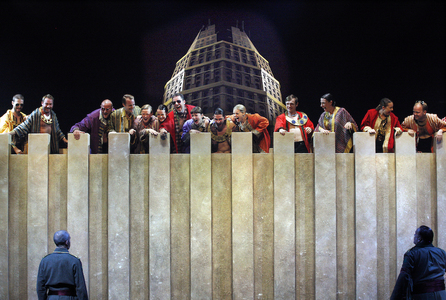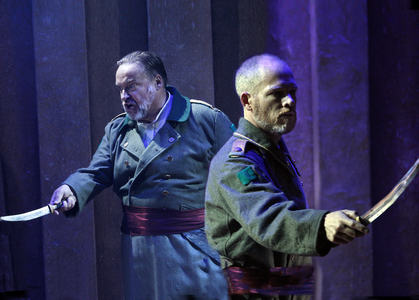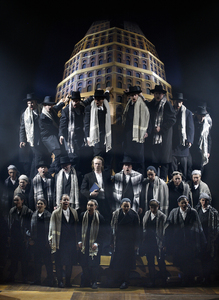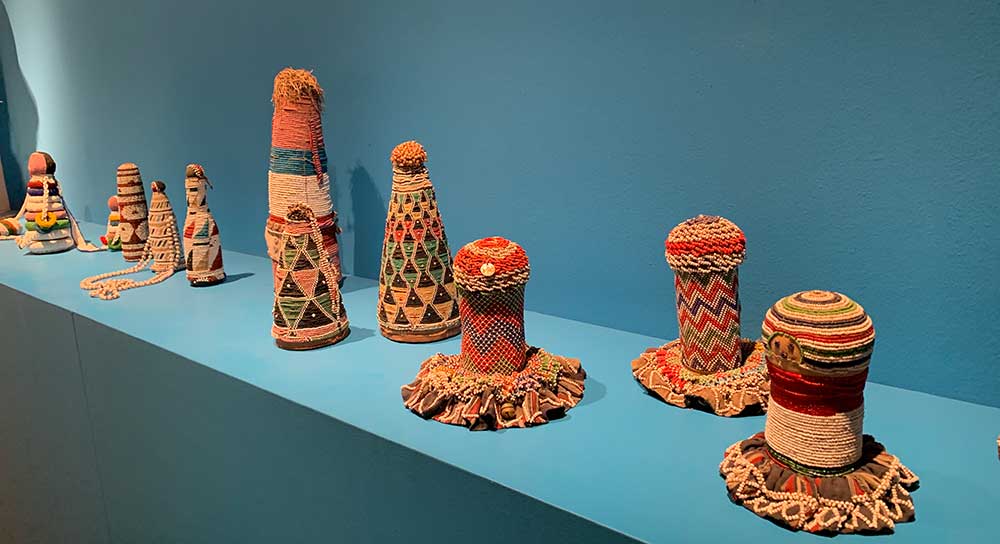Belshazzar by Georg Friedrich Händel seen at The Grange Festival, Northington, UK, July 4, 2019
Bizarrely this is the first professional production of Händel’s oratorio Belshazzar (1744) in the UK. It is true that oratorios originally weren’t intended to be staged with scenery and costumes, but this tale about the hedonistic son of the last Babylonian king works a treat as an opera. The one weakness is that it doesn’t have all that many truly memorable arias, but on the other hand the choir has a lot of good tunes.
When you have a bunch of singers like The Sixteen for this kind of material and with Harry Christophers, who started the choir 40 years ago, in the orchestra pit, not much can go wrong. At least not musically. But is there enough drama for the staging to hold up?

With a 5.30 start and 9.50 end Harry Christophers has no intention of hanging about. He conducts the overture with crisp and brisk determination. Director Daniel Slater starts off the proceedings with a brilliant move: the coffin with the body of the slain Belshazzar is brought on during the musical opening and then his mother Nitocris (Claire Booth) enters to mourn his violent death. The choir mocks her silently. This makes Nitocris’s, the Queen Mother, opening recitative and aria on the nature of human fallibility all the more powerful. Then we swiftly move back in time and see the Persian Prince Cyrus ( Christopher Ainslie) and his general Gobrias (a Babylonian nobleman who has defected to the Persians) stand in front of the city walls of Babylon. On top of wall the cheerfully dressed Babylonians deride the Persians. When Cyrus gets to sing his air Dry Those Unavailing Tears, I couldn’t suppress a smile. It seems slightly ridiculous that this conquering king has to sing in a counter-tenor voice. But you get used to it and Ainslie is throughout excellent at portraying both the warrior and the magnanimous ruler.

The chorus gets to do many costume changes due to the fact that they perform three different roles. One minute they are Babylonians, next minute they are the Jews held captive by those same Assyrians led by Belshazzar. On top of that they also get to double as Cyrus’s army. Just when the plot seems a little bit dull and moralistic it turns out that the Babylonians are inveterate party people. The threat of the Persian army invading the city can’t deter this pleasure-seeking lot living it up. Director Daniel Slater has hired three acrobats to liven up the feast of Sesach and it works a treat. Were it not for Robert Murray’s attention grabbing performance as the sybaritic Belshazzar, Haylee Ann’s excellent aerial acrobatics would have stolen some of the party scenes. Murray brings all the enthusiasm of (relative) youth to the role and suggests that this immature co-regent (his father, the king, has gone into temporary exile) never will be fit to be a respectable king. Murray is a consummate performer with an all-round tenor voice. When the writing on the wall appears (mene, mene tekel upharsin) the prophet Daniel is summoned to decipher the mysterious words. Daniel, is not a very grateful role, despite a couple of decent arias, but James Laing managed, after some initial roughness at the edges, to redeem himself after the long interval.

The prescient Queen Mother is a real party pooper and Claire Booth gets to show off her versatility in the role. She is never better than in the heartfelt Regard, O son, my flowing tears. With Gobrias leading the way the Persians enter the city without much opposition. Cyrus fights Belshazzar but in this version Gobrias gets to kill him. It is a bit of luxury casting to have the excellent bass baritone Henry Waddington in the smallish role of the vengeful Assyrian military leader.
Cyrus is finally shown to be goodness personified. He grants the Jews freedom and promises to rebuild Jerusalem. He also wants to be like a second son to Nitocris. Christopher Ainslie is the perfect Händel countertenor who effortlessly taps into the range of emotions that Cyrus shows. He avoids becoming a goody-goody as Cyrus the Great, which doesn’t stop him from adding a layer of sweetness to the voice.
But it is the The Sixteen that in the end convince me that this is an oratorio worth staging (and I enjoyed designer Robert Innes Hopkins’s clever use of the Breughel-inspired Tower of Babel).

The members of the chorus often clearly reveled in the different guises they could assume and their lively acting made some of the heavy handed texts more palpable.
It is no surprise that Händel in his music quite clearly illustrates the differences when underscoring the Jews, the Babylonians or the Persians. Conductor Harry Christophers and The Sixteen Orchestra are in this production showing that they are now also ready to become major players in the opera genre.
A visit to the the Grange Festival has for the better part of this century been a must on the Country House Opera calendar. The splendid English landscape garden has now been restored to its original best. Together with the tastefully distressed interiors and façade of the Grange building they form an ideal backdrop for a picnic during the long opera interval. Despite being nestled deep in the Hampshire countryside, the festival attracts major orchestras like the Academy of Ancient Music, Bournemouth Symphony Orchestra and The Sixteen. It is also great to see that these country house events no longer mainly have to rely on fairly inexperienced singers but also attract major players.



